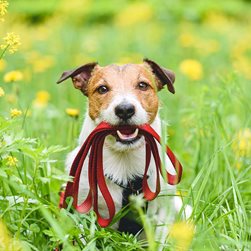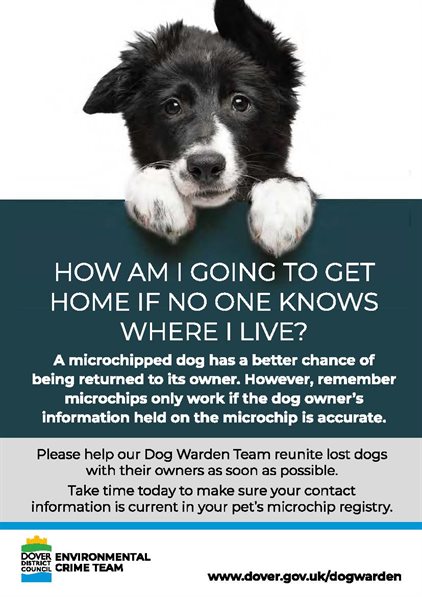Dog Warden

Report a Stray Dog
What if I find a stray dog?
If you find a dog on its own in a public place and it is safe to do so, check the identity tag on the collar and, if possible, make arrangements with the owner for the dog to be returned.
If there is no identity tag please secure the dog (only if it is safe to do so) and contact us on:
- 01304 872289 (weekdays 9am to 4.30pm)
- 01304 821199 (out of office hours including weekends and bank holidays)
- Please note that there is a limited Stray dog collection service between Christmas Day and 2nd January 2026 This means that any stray dogs bought to DDC during the festive break cannot be returned to their owners until the 2nd January 2026 following all fees incurred being paid.
Tell us as much as you can about the dog:
- Where and when you found it
- Breed
- Colour
- Sex
- Name
- Distinguishing marks
What we will do
An officer will contact you to arrange collection of the dog. Please note if outside of office hours (including weekends and bank holidays) the officer will need to make arrangements to meet you at the DDC offices at Whitfield.
The dog will be scanned for a microchip so that we can try and make contact with the owner or we will place the dog in kennels.
Report a Lost Dog
What do I do if I have lost my dog?
If you have lost your dog please contact us on:
- 01304 872289 (weekdays 9am to 4.30pm)
- 01304 821199 (out of office hours including weekends and bank holidays)
Please provide us with the following information:
- Your name, address and contact number
- Location, date and time lost
- A detailed description of your dog
What we will do
We will speak to our Dog Warden to find out if the dog has been reported to us.
If the dog has not already been reported to us, our Dog Warden will be made aware that the dog is missing.
How do I get my dog back?
If your dog has been seized by our officers as a stray and placed in kennels we will need details of where and when the dog was lost. We will also require proof of ownership/keepership that can include:
- Vaccination certificates
- Written confirmation from a vet registered with the Royal College of Veterinary Surgeons
- Pedigree certification
- Receipt of purchase from a licensed breeder
- Pet insurance certificate
- Microchip certificate
- Vet bills or records
Please note that if inadequate proof is produced, the dog will not be released - this is to protect the dog and the legal keeper of the dog.
If we are satisfied that you are the owner, you will be notified of the stray dog's fees that must be paid in full before the dog can returned to you.
Should any veterinary costs be incurred whilst the dog is in our care, you will also be required to pay these in full.
| Type of service |
Amount to be paid |
| Call Out Fee including Statutory Government Fee |
£100.00 |
| Kennelling Fee (per day) - Maximum 7 days |
£32.50 |
| Out of Hours Fee - If the dog is taken to kennels outside of normal working hours |
£75.00 |
Payment can be made to Customer Services on 01304 872289 (weekdays 9am to 4.30pm).
When full payment has been made, our Dog Warden will contact you to make arrangements for the dog to be returned.
Please note that if you do not pay the fees incurred within 7 days of your dogs siezure under the Environmental Protection Act 1990 your ownership will be relinquished and the council may rehome your dog.
Dog Fouling
Apart from the obvious unpleasant effects of dog fouling there are potential health risks.
Microchipping
The laws have changed
- By law, all dogs must be microchipped from the age of 8 weeks. If your dog does not have a microchip, or your details are not recorded on an approved database, you may be served a 21 day notice. Failing to comply could see a fine of up to £500.
- Also by law, all dogs must wear a collar and tag with their owner’s name, address and telephone number on.
- A microchip is a very small electronic device, which is coded with a unique number that can be read by a scanner and entered into a central database. If your dog strays, the Local Authority, Vet or Animal Welfare organisation will be able to scan your dog and contact the database to trace ownership.
- Remember to update the microchipping company if you move address or change telephone numbers.
Check a Chip Campaign

Following the introduction of these regulations, our dog warden service has observed a trend of:
- a reduction in the number of stray dogs without microchips; and
- an increase in the number of stray dogs whose microchip contact information is not up to date.
15 August is national check the chip day in the United States, and Dover District Council's Dog Warden team launched it's “Check a Chip” campaign in support of this. This has involved:
- Attending events and offering free microchip checks. We have checked 170 chips at events in 2024.
- Sharing campaign posters and literature with veterinary practices, pet shops, dog groomers, licensed dog breeders and rehoming centres, mobile phone shops and estate agents.
- Social media posts.
This campaign aims to:
- Reduce the number of stray dogs being transferred to kennels.
- Reduce the number of enforcement notices requiring contact information of dog owners to be updated with microchip databases.
Dog Control
Every dog must wear a collar and tag with its owner’s name and address when in a public place. It is an offence for a dog to be in a field with livestock without being on a lead or under some other form of control. A landowner or anyone acting on their behalf, is entitled to shoot any dog if they believe it is the only reasonable way of stopping it worrying livestock. Cases where a dog is out of control and/or worrying livestock should be reported to Kent Police.
Dangerous Dogs
It is an offence to:
- allow a dog to be dangerously out of control in a public place
- allow a dog to be dangerously out of control within private property
Any dog is dangerously out of control if:
- it injures a person; or
- it behaves in a way that makes a person worried that it might injure them.
If your dog injures another person's animal, or an owner of an animal reasonably believes that they could be injured if they intervened to protect their animal from your dog, then an offence may be committed.
If you do not keep it under control, your dog could be destroyed and you could be banned from keeping a dog or you might be ordered to keep it muzzled when taking it for a walk.
If you have suffered injuries as a result of an incident involving a dog, were in fear of suffering from an injury, or you believe a dog to have been dangerously out of control, please contact Kent Police to report the incident by telephoning 101. If the police advise you to contact us, please refer to The Dangerous Dogs Act 1991 and ask them to deal with your report. If there is an immediate risk of harm or your life is in danger, call 999.
Prohibited Types of Dog
In addition, the Dangerous Dogs Act prohibits four types of dogs from being bred, sold or owned in England and Wales. These dogs are:
- Pit Bull Terrier
- Japanese Tosa
- Dogo Argentino
- Fila Brasileiro
Owners of these banned breeds can apply to the court for their dog to be exempted from the ban if they are deemed not to be a risk to the public. Alternatively the court could order for the dog to be destroyed and the owner could face prosecution.
Owners of suspected banned dogs should be reported directly to Kent Police by telephoning 101.
Please note that from 31 December 2023, it will be against the law to:
- sell an XL Bully dog
- abandon an XL Bully dog or let it stray
- give away an XL Bully dog
- breed from an XL Bully dog
- have an XL Bully dog in public without a lead and muzzle
From 1 February 2024, it is a criminal offence to own an XL Bully dog in England and Wales unless your dog has a valid Certificate of Exemption.
Further information can be found on the following web links:
Guidance apply-for-a-certificate-of-exemption-to-keep-an-xl-bully-dog
Guidance prepare-for-the-ban-on-xl-bully-dogs
Dogs Locked in Cars
Do not leave your dog in a parked car, even for a few minutes - even if it seems cool outside it can become very hot, very quickly. Parking in the shade and/or keeping the windows down does not make it safe!
If you see a dog in distress in a parked car, call Kent Police on 101 or the RSPCA on 0300 123 4999.
Make sure you have a supply of water and know where you can stop off en-route for water breaks. Dogs are not able to cool down as effectively as humans so could suffer from heat stroke and dehydration very quickly.
Barking
For information relating to noise / dog barking please visit the following link:
Rehoming a Stray Dog
We do not offer a rehoming service for unwanted pets. However there are several organisations that can help rehome an unwanted dog. Each will have different procedures so please check before taking an animal to them.
Below are just a few charities that may be able to take on an unwanted dog:
Dog Bins
Dog Control Areas
A Public Spaces Protection order is in place and requires dogs to be kept on leads in some areas and also bans dogs from some beaches and play/sport locations. Breach of the PSPO may result in the issue of a fixed penalty notice of £100 (reduced to £75 if paid within 10 days). Payment of this penalty discharges the liability to prosecution.
For further information on our Public Spaces Protection Order including where it applies please visit our Public Spaces Protection Order webpage:
Contact
Email: envcrime@dover.gov.uk